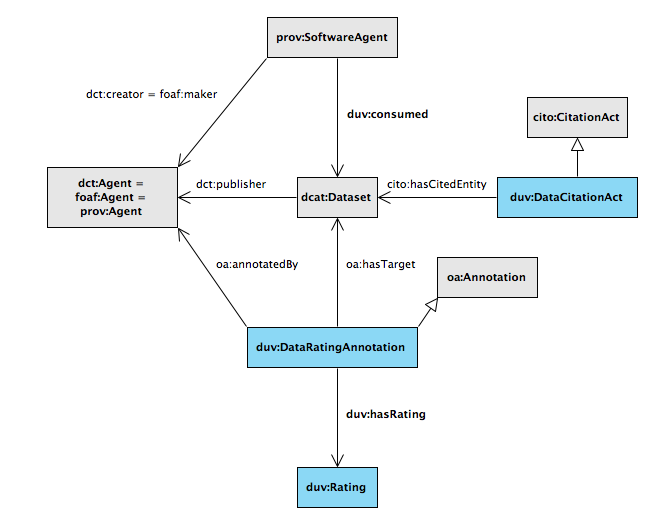- From: Joćo Paulo Almeida <jpalmeida@ieee.org>
- Date: Fri, 05 Jun 2015 09:38:56 -0300
- To: Public DWBP WG <public-dwbp-wg@w3.org>
- Message-ID: <D1971EB0.A3566%jpalmeida@ieee.org>
Dear All, When analyzing the current version of the Data Usage Vocabulary, I found the need to propose several changes, so I attach here a diagram with my proposal for DUV. I hope that you will agree with me that, while we have a good start, we are not ready to go FPWD with DUV. One general remark is that the current version relies on a number of vocabularies (some of which are not stable like bibo, cito). I think we should minimize those dependencies as much as possible, and replace them with more stable and well-known vocabularies, more specifically I mean DCMI Metadata Terms (dct [1], which is already used in DCAT), and the W3C PROV Ontology (prov [2]). I am not sure about the status of Open Annotation and how we should we use (details below). Further, there are some fragments which do not need to be ³reinvented", so we can just reuse. This is to me the case with Application. I see three clear modules for the DUV effort: * A) Data usage representation (in the sense that a software agent is dependent on the dataset) * B) A particular kind of usage which is citation * C) User feedback/rating representation Detailed comments below: With respect to A, I propose to use prov:SoftwareAgent instead of Experience/Application/WebOfThing. I propose to change duv:consumes to duv:consumed. Further, I think that we need to be able to reify this Consumption (or Usage if we prefer that other term). This would be a solution similar to what PROV does with respect to attribution. It includes a simples wasAttributedTo, but this can be qualified with an Attribution resource, which reifies the attribution and allows for more information about the attribution to be captured. I think we should do this here because A is actually the core of DUV, and is currently only one property in the whole thing. With respect to B, I don¹t think we need to enter the business of specifying the range of cito:hasCitingEntity, specially not with bibo. So, in my opinion, we should say nothing about this, and therefore introduce no dependence to bibo. With respect to cito, the only thing we would be doing is subClass cito:CitationAct into duv:DataCitationAct (I propose to rename duv:Citation, because since we are using cito, we should use their convention in the nominalization which is better and clarifies that Citation here is an Act.) We should examine this solution altogether, because citing data is already possible without us doing any specialization of the vocabulary. So, B, could be altogether left out from DUV and we could just give examples of how to cite data using cito (and even bibo). If we decide to include duv:DataCitationAct then there should be some reason further than constraining cito:hasCitedEntity to have a range of dcat:Dataset. With respect to C, if we go with Open Annotation, then we could call what is currently called duv:Feedback as duv:DataRatingAnnotation. However, note that Open Annotation suggests that we do not subclass oa:Annotation because of particular motivations for annotation but instead use SKOS and create instances of oa:Motivation. In this case, we should eliminate duv:Feedback altogether, and just understand User feedback/rating as a new instance of oa:Motivation (e.g., oa:rating). (see current list at [3], which does not include in my opinion something like oa:rating). What currently is duv:has_rating would be some subclass of oa:hasBody (or it would just be oa:hasBody). This requires more discussion as I found the current examples unclear, which bodies of the annotations that are just text. So, perhaps, all our effort with respect to ³C², would just be in creating conventions to use Open Annotation and not a specialization thereof. I did not understand duv:retains. I am sorry I have to send regrets for the meeting today. Best regards, Joćo Paulo [1] http://dublincore.org/documents/2012/06/14/dcmi-terms/ [2] http://www.w3.org/TR/prov-o/ [3] http://www.openannotation.org/spec/core/20130208/core.html
Attachments
- image/png attachment: B7524D0D-509B-4353-B063-012E9A33DC35.png

Received on Friday, 5 June 2015 12:39:36 UTC